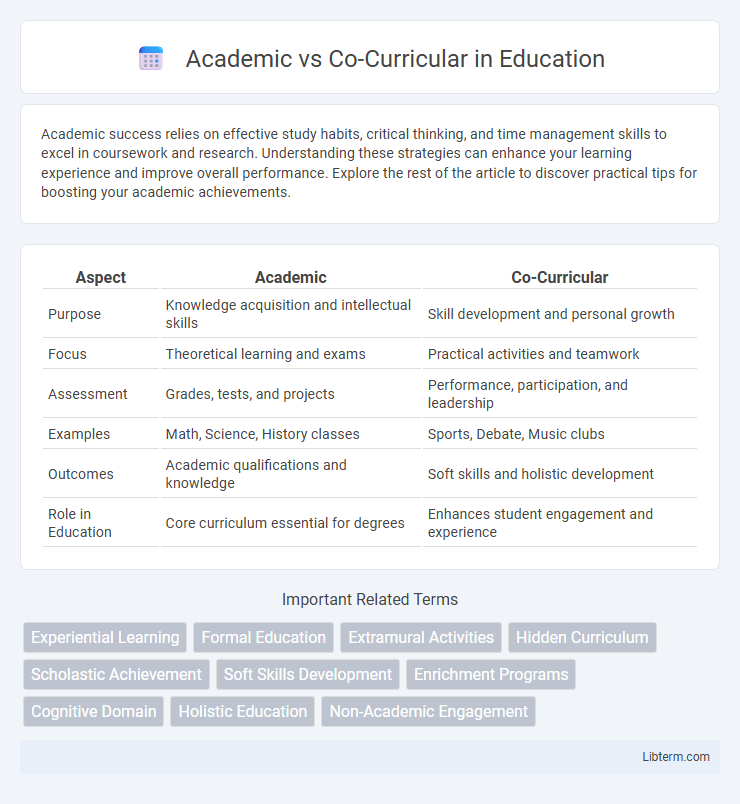Academic success relies on effective study habits, critical thinking, and time management skills to excel in coursework and research. Understanding these strategies can enhance your learning experience and improve overall performance. Explore the rest of the article to discover practical tips for boosting your academic achievements.
Table of Comparison
| Aspect | Academic | Co-Curricular |
|---|---|---|
| Purpose | Knowledge acquisition and intellectual skills | Skill development and personal growth |
| Focus | Theoretical learning and exams | Practical activities and teamwork |
| Assessment | Grades, tests, and projects | Performance, participation, and leadership |
| Examples | Math, Science, History classes | Sports, Debate, Music clubs |
| Outcomes | Academic qualifications and knowledge | Soft skills and holistic development |
| Role in Education | Core curriculum essential for degrees | Enhances student engagement and experience |
Introduction: Defining Academic and Co-Curricular Activities
Academic activities involve structured learning experiences focused on intellectual development, such as lectures, assignments, and examinations within formal education systems. Co-curricular activities complement academics by promoting skills like teamwork, leadership, and creativity through sports, arts, clubs, and community service outside the classroom. Both are essential for holistic education, blending cognitive growth with practical life skills.
Core Differences Between Academic and Co-Curricular Pursuits
Academic pursuits primarily involve structured learning activities such as lectures, exams, and research focused on intellectual development and knowledge acquisition. Co-curricular activities complement academics by fostering skills like teamwork, leadership, and creativity through sports, clubs, and community service. The core difference lies in academics targeting cognitive growth and certification, while co-curricular pursuits enhance personal and social skills essential for holistic development.
Role of Academics in Student Development
Academic education forms the foundation of student development by enhancing critical thinking, knowledge acquisition, and intellectual skills essential for lifelong learning. It equips students with subject-specific expertise and analytical abilities that prepare them for higher education and professional careers. The rigorous academic curriculum fosters discipline, time management, and problem-solving skills crucial for holistic personal and cognitive growth.
Importance of Co-Curricular Activities in Holistic Growth
Co-curricular activities play a vital role in holistic growth by complementing academic learning with practical skills, emotional intelligence, and social development. Participation in sports, arts, and clubs enhances teamwork, leadership, and time-management abilities, fostering well-rounded individuals. Research shows that students engaged in co-curricular activities often achieve higher academic performance and improved mental health, highlighting their importance in comprehensive education.
Academic Achievements: Benefits and Challenges
Academic achievements foster critical thinking, subject mastery, and higher educational opportunities, enhancing students' overall knowledge and career prospects. These accomplishments provide measurable success through grades and standardized tests, which can motivate and set benchmarks for future learning. However, intense focus on academics may lead to stress, reduced creativity, and limited development in social and practical skills outside the classroom.
Co-Curricular Engagement: Skills and Opportunities
Co-curricular engagement enhances critical skills such as teamwork, leadership, communication, and problem-solving, complementing academic knowledge by providing practical experiences. Participation in clubs, sports, arts, and community service offers opportunities for personal growth, networking, and real-world application of classroom theories. These activities foster holistic development, better preparing students for professional environments and lifelong learning.
Balancing Academic Performance with Co-Curricular Participation
Balancing academic performance with co-curricular participation enhances student development and fosters essential life skills. Integrating structured study schedules with regular involvement in sports, arts, or clubs improves time management and social interaction. Research shows students engaged in both academics and co-curricular activities often achieve higher overall success and well-being.
Impact on College Admissions and Career Prospects
Academic achievements such as high GPA, advanced coursework, and standardized test scores remain crucial factors in college admissions and can significantly influence scholarship opportunities. Co-curricular activities including leadership roles, community service, and participation in clubs or sports showcase well-rounded skills, enhancing personal statements and interviews to make candidates more competitive. Employers and admissions officers increasingly value the combination of strong academics with diverse co-curricular involvement, as it demonstrates both intellectual capability and essential soft skills like teamwork and time management.
Case Studies: Successful Integration of Both Domains
Case studies revealing successful integration of academic and co-curricular domains demonstrate significant improvements in student engagement, critical thinking, and real-world problem-solving skills. Institutions like Stanford University incorporate co-curricular activities such as research projects, internships, and student organizations alongside rigorous academic programs, fostering holistic development. Empirical evidence from these cases underscores the positive impact on career readiness and interdisciplinary learning outcomes.
Conclusion: Finding the Ideal Academic-Co-Curricular Balance
Achieving the ideal balance between academic and co-curricular activities enhances students' overall development and maximizes learning outcomes. Integrating both aspects fosters critical thinking, social skills, and emotional intelligence while maintaining academic excellence. Schools that prioritize a holistic approach create well-rounded individuals prepared for diverse real-world challenges.
Academic Infographic

 libterm.com
libterm.com